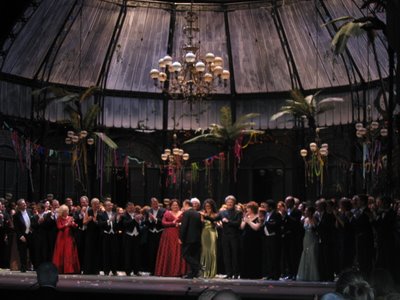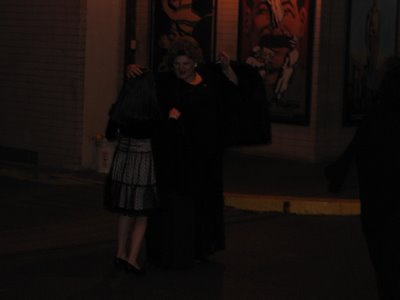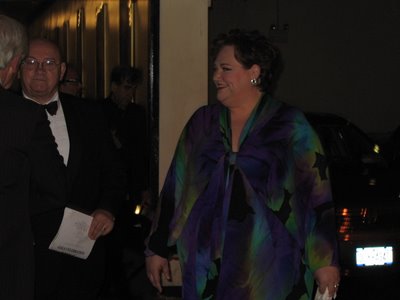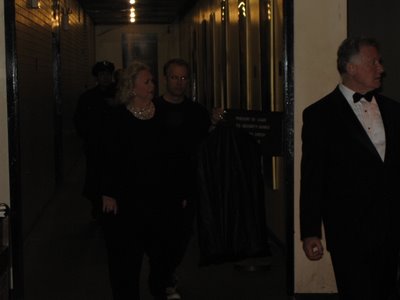
It has come to my attention that I have developed a reputation for being an incorrigible tease. Sorry about that, folks. If you really want the goods, send me an email and encourage me--It helps to know that people actually want to read what I have to say and see my photos, etc.
Yes, I went to the Volpe gala. Yes, I was in the tenth row of prime orchestra. Yes, I have photos--and more. After being upbraided by an usher in the front row of grand tier for snapping photos of the Lohengrin curtain calls, I was somewhat timid, but with hundreds of flashes going off at the end of the gala program, and during Renee's song that closed the show, I clearly wasn't vulnerable.

I don't think there was a dull moment in the entire show. So many highlights, but if you put me on the spot (this in whatever order they come to me): Denyce Graves's ridonkulous low note, delivered with a mischievous smile; Stephanie Blythe's I'm-gonna-blow-the-roof-off fff note; Dmitri's astonishingly beautiful tone, impossible breath control, and genuinely involved acting; the adorable antics of Kiri Te Kanawa and Frederica von Stade; Renee Fleming's sumptuous Verdi; the delicious magic carpet ride of the Cosi trio; Ben Heppner in excellent voice; Karita's unusual and exciting take on "Vilja"; Karita's chemistry with Thomas Hampson in the tuneful "Lippen schweigen"; I actually liked the Ben Moore opening number; "When I have sung my songs" (not a new song, Sarah) delivered with delicious legato by Renee; watching the singers sitting at the table during "Parto, parto" and "Una furtiva lagrima" was delicious fun; the Fidelio finale; the ovations; hearing Kiri's voice again, and her elegant delivery; the scene changes; the beautiful set from Don Carlo; the Act III prelude of Lohengrin; Placido Domingo's large steel-and-diamond voice; the catchy and fun "L'Italiana" duet, with its staccato coloratura; being introduced to some music that's new to me (half of the Die tote Stadt; the Berlioz; half of the Domingo; the Don Carlo arias; the La Favorite aria; others--I did prepare for some of these by means of iTunes downloads, however)
Details to come. Eventually.

UPDATE:
I just read Tommasini, and I wanted to note that, as you can see from the original time stamp of this post, I used the word "sumptuous" to describe Renee's Verdi and "elegant" to describe Kiri's Korngold before reading the article. I agree with everything he says, except for his takes on Dessay and Freni. This was my first time hearing Dessay live, and I have to admit that I was surprised by the ragged, dry, unhealthy-sounding tone. That loud high E-flat (if my ear was working properly--I don't carry my pitch fork either, Sieglinde) wanted to impress me, but it made me frown. As for Freni, her speech was rambling and I didn't get the sense that the audience was with her. But, then again, I was sitting next to a woman . . . who didn't know who Renee Fleming was.
UPDATE (12:45PM, 5/22/06):
I'm going to post updates whenever I get a chance, throughout the day.
For the middle bit of Part I, the Met used "Scenery for Act I of La Traviata designed by Franco Zeffirelli". While beautiful, it is also very busy, and dim lighting made it extremely difficult to see the singers. Even for me--and remember where I was sitting. Well, actually, I was rather to the right, and the singers clearly had been instructed to stand stage right, so that didn't help. Anyway, all of this, plus my postnasal-dripping-and-throat-clearing-and-coughing neighbor to my left, and my I-can't-stand-sitting-through-this-why-is-my-husband-making-me-do-this neighbor to my right, distracted me too much. However, what's fortunate is that, while my immediate experience is often affected by these annoyances, my memory of the performance generally remains untarnished.
I have not yet listened to my recording of the radio broadcast (thanks again, Harvey) because I want the memory of those sounds to linger in my head; I don't want to erase them, overwrite them with the inferior electronic substitute. Earlier today, as I was reflecting on Renee Fleming's performance of the Verdi, it came to me: her voice was like moonlight and like gentle, swaying breezes. How appropriate, give the text of the aria! Sometimes I think we forget that voice is nothing but a cascade of waves. Renee Fleming's performance reminded me that voice travels through the air. As she breathes, the muscles of her lower abdomen expand as the diaphragm pushes down and the lungs inflate. Like the spindle of Rumplstilskin, turning straw intro gold, Renee converts the air into something even more precious, and its value is located precisely in its evanescence.
Following Kiri Te Kanawa's "Mariettas Lied", silver and gentle, the set descended into the depths of the Met, marking an ending. With any hope, there will be another time. As the song says ("Mariettas Lied" is after all a song withing a song, or a song within an aria), we hope that there will be an afterlife, that love--that we--will find a new place in death. If the performance lives for only the short time we are in the hall, then the end of every performance marks a death, and we all hope for the chance the live it again. Not to re-live it (because once the moment passes, it can only be an archive, a memory, a souvenir, a souvenir), but to live something as good, as blissful, as happy.
UPDATE (5:50PM, 5/22/06):
I waxed philosophical in my last update; now it's time for some gossip . . . well, "gossip" to the extent that I engage in it. (I have a nasty web site in mind where you can find the skankiest opera gossip imaginable. Would never give it the honor of a link.) So, who did I see in the glittering hall?

Well, I had a very moving moment just seconds after entering the hall. I got on the subway down the block from my Upper West Side hotel and came through the lower level of the Met. Ascended the stairs and, heading to the doors between orchestra right and orchestra center, who do I see out of the corner of my eye but . . . Judy Drucker? Drucker, impresaria extraordinaire, has brought the stars of classical music and opera to South Florida stages for some four decades. She opens every performance with a bubbly speech.
Indeed, it was her unamplified speaking voice that I heard first at Dade County Auditorium the night I heard my first great classical voice. Yup. She, quite literally, introduced me to Kiri Te Kanawa.
I approached Drucker and told her I'm a fan, that I'm from South Florida, and that I now live in Boston and go to Harvard. She was touched and she held my hand as asked me my name and told me about next season. She said she'd remember my name when I call. And indeed, when I ran into her during intermission, she remembered it.
But before my second encounter with Drucker, there was another encounter (albeit a silent one) with another celebrity who knows my name--and even knows how to spell it. Yes, just as I exited from the side doors of right orchestra to head to the men's room, who do I see but Renee Fleming? In a black suit. Missing an opportunity to say hi (I had just seen her the night before and told her I would be attending), I watched as she pointed to a friend and pursed her lips; the two hugged and kissed as they reached one another.
Post-men's-room, I contemplated taking a stroll on the plaza, so I headed up to the landing near the ticket takers, and found Denyce Graves standing there in all her splendor. A friend, or somebody, asked her when she would be singing, and she replied, "I just sang! You didn't hear me!?"

Barbara Cook sat in my section, in the first or second row, and spent a good deal of the hour-long intermission chatting while standing between center and right orchestra.
And, of course, there was Barbara Walters, quite conspicuous in the center of Center Parterre. Diamonds, diamonds, diamonds. She has a regal bearing, one that's rather self-conscious and affected, but the woman looks good.
Then there was the stage door. Lovely Kari, who attended a show nearby, greeted me there and told me that she'd heard someone say that Kiri Te Kanawa had already left. I noticed her absence during "When I Have Sung My Songs" and the final curtain call, so this made sense.
The freakline (to borrow a term from Sieglinde) wasn't very long, but we did see a few stars, and, later, across the plaza, had a brief exchange of shouted niceties with Frederica von Stade.

UPDATE (7:30PM, 5/23/06):
I thought it might be a good idea to post some pictures of the program.
Immediately upon entering the hall, I noticed a sign announcing some changes. Ruth Ann Swenson had called in sick, and Salvatore Licitra was stuck somewhere out of the country. There were also a couple changes of conductor, but nothing noteworthy.
As for the program itself, there was the typical Playbill plus an off-white insert listing patrons, sponsors, etc. This insert also included the texts of the two Ben Moore songs. Here are excerpts from that insert:




The Playbill was rather a precious thing. During intermission, the regular piles of extras were nowhere to be found. I asked an usher for one (an untainted copy, as a souvenir), and he reached into a vault and reluctantly handed me another. Here are excerpts from that pristine copy:






In addition to the program and the insert, there was a book called The Volpe Years: 1990-2006 (also published by Playbill), detailing Volpe's legacy season by season. Copies of this item flooded the halls during intermission, and I caught several patrons picking up extras. I took one extra. Some really neat pictures in it.
More updates to come.
UPDATE (10:30PM, 5/23/06):
Here's some video of the ovations:
1 comment:
It cannot have effect in actual fact, that is exactly what I think.
Post a Comment